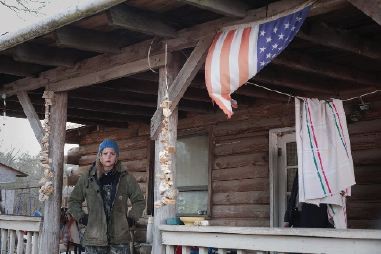Winter's Bone

Inauthenticity can come in a variety of forms. Debra Granik’s Winter’s Bone, which she and Anne Rosellini adapted from a Daniel Woodrell novel, bends over backward to convince us that its portrait of life in an Ozarks community blighted by poverty, drugs and brutality is the documentary truth. But the picture is as phony as a three-dollar bill.
Cinematographer Michael McDonough textures the film to look like old sepia photographs. The actors are clearly chosen because they look as if they belong in this setting: wary eyes in emaciated faces, exhausted bodies that look used to punishing daily labor. And Granik keeps them tightly reined in.
The protagonist is 17-year-old Ree Dolly (Jennifer Lawrence), who wants to join the army but has to take care of her mother (Valerie Richards)—who’s so depressed she’s stopped speaking—and a younger brother and sister. Ree’s father was arrested for cooking crank. He put up the house to make bail and then disappeared. When he doesn’t show up for his court date Ree learns that their home will be forfeited within the week. She’s sure her father was murdered by a dope-dealing gang, and she risks her life—in an environment where silence is the rule and traitors and witnesses are equivalent liabilities—to find out what happened to him so her family can keep the house.
Winter’s Bone is the flip side of The Grapes of Wrath. The poor and dis possessed are symbols, but not of en durance in the face of an oppressive socio economic system and bad luck, but of the evil to which a wretched environment can reduce a human being. This scenario is just as rigged as Steinbeck’s. Granik and Rosellini are so determined to prove their point that they don’t permit their characters to enjoy a moment’s peace and relaxation. The one exception—a woman (musician and folklorist Marideth Sisco) who sings a traditional song accompanied by family members—provides the only scene that feels genuine.
Humorlessness is a mistake film makers make when they want to make serious points. For the viewer, it’s emotional blackmail: if you say that you feel this relentlessly grim movie is punishing, you’re in danger of appearing superficial or bourgeois or self-indulgent. But who could believe in people who never crack a joke? Mordant humor is a human reflex, a survival instinct.
In the final scene of the much-praised Brokeback Mountain, Ennis Del Mar (Heath Ledger) visits the parents of the man he loved, who has recently died. To emphasize how poor they are, the film shows a home with completely bare walls. But that’s nonsense. In perhaps the greatest book written about the Depression, Let Us Now Praise Famous Men, James Agee spends an entire chapter enumerating all the possessions of the dirt-poor Alabama family he lived with, including all the drawings and crafts with which they decorated the walls of their shack. Real poor people have the same impulses as those more fortunate: they want to make their surroundings, however deprived, into homes. Agee struggled against turning his subjects into symbols. To Granik and Rosellini, that’s all they are.
Ree doesn’t succumb to vice or despair because she’s the heroine; she’s Little Nell of the backwoods, a purely melodramatic conceit. If Winter’s Bone were a silent movie, she’d be played by Mary Pickford, the plucky megastar of the 1920s who earned the name America’s Sweetheart—though Pickford would supply the humor and poetry that Granik leaves out.
Lawrence is a talented young performer who does fairly well with back-to-back episodes of grief and adversity, but except for that musical interlude, the picture only comes to life when John Hawkes is on screen as Ree’s coke-addicted uncle and in Sheryl Lee’s single scene as one of several women who counsel Ree on her quest. Hawkes and Lee are terrific actors who instinctually add emotional layers to their characters. They understand the secret that eludes Granik and Rosellini: a movie can’t depict authentic life unless its characters’ humanity shines through.




